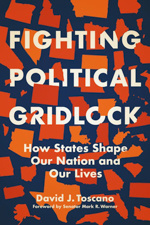Lessons from Virginia: A New Blog Post by David J. Toscano, author of FIGHTING POLITICAL GRIDLOCK
Lessons from Virginia: A New Blog Post by David J. Toscano, author of FIGHTING POLITICAL GRIDLOCK

We are pleased to offer this original blog post by David J. Toscano, author of FIGHTING POLITICAL GRIDLOCK: How States Shape Our Nation and Our Lives with a foreword by Senator Mark R. Warner. You can read more in the Falls Church News-Press here.
Lessons from Virginia
As the former Democratic leader in the Virginia House of Delegates, I witnessed Terry McAuliffe’s lead in the 2013 governor’s race collapse in the aftermath of the botched rollout of the federal health care exchanges. He won, but only because the campaign ended before the full force of the public’s anger could be felt.
Four years later, it was the Republicans’ turn to feel the cold wind blowing from DC, as strong anti-Trump sentiment not only vanquished the GOP candidate and produced Governor Ralph Northam’s 9-point victory but brought Democrats within a coin toss of parity in the House of Delegates.
Hence, it should surprise few that Washington politics should extract a toll on the Commonwealth, helping to propel Republican Glenn Youngkin to a narrow victory in the Governor’s race and allowing Republicans to retake the majority in the House of Delegates that they had lost two years ago.
Most elections turn on a variety of factors. As Democrats scurry to learn the lessons of last Tuesday’s performance, here are a few to consider:
- The nationalization of state politics is stronger today than at any time in decades. Virginia Democrats pushed and passed popular initiatives during their years in control of state government--Medicaid expansion, the ERA, minimum wage increases, gun safety measures, and despite the rhetoric of “defund the police,” enhanced funding for law enforcement. But many voters were not focused on what Democrats were doing in Richmond. Instead, they were angry with what Democrats were not doing in Washington. Most voters do not become enmeshed in internecine party scrabbles between progressives and moderates. They want results. Right now, they are not getting them from DC, and Democrats are taking the blame.
- Schools and parents’ matter. Mr. Youngkin seized on Mr. McAuliffe’s remark that he didn’t “believe parents should be telling schools what they should teach,” and thereby undermined the former governor’s promise to make “historic” investments in education and teacher salaries. Exit polling reported that a supermajority of Virginia voters believe parents should have a voice in what schools teach their children. Youngkin’s positioning undermined a key element of the Democratic coalition--suburban women. Two counties where Democrats had gained substantially in recent years illustrate the change. In Loudoun County, McAuliffe won by 11 percent, but this pales in comparison to Biden’s 25-point margin in 2020. Similarly, Democrats had won Chesterfield, a traditionally red county adjacent to Richmond, by 7 points in 2020, only to lose it by 11 this year. Finally, McAuliffe dramatically underperformed with women. Biden won this key constituency by 23 points. Despite McAuliffe’s support for reproductive rights, exit polls indicate that he won this group by only six points. Education, a uniquely state issue where Democrats had dominated, had been weaponized against them. Expect this to become a key element in the GOP strategy in the midterms.
- We remain incredibly divided into our respective political tribes. There was little ticket-splitting in Virginia, and that resulted in Democratic losses in close races up and down the ticket. Youngkin’s victory was neither a landslide nor a mandate. If it had occurred 10 years ago, it would have appeared to be just another Republican victory. But the formerly reliable red state has changed in the last two decades--and a GOP win is therefore perceived as disruptive.
- Voting rights matter. Virginia democrats made voting much easier, instituting no-excuse early voting for 45 days prior to the election. It is one reason why the Commonwealth saw the largest turnout for a governor's race in recent history--by a lot. Much of the early vote came from reliably red areas across the state. Even as McAuliffe won 600,000 more votes than in 2013 and 200,000 more than Northam’s total in 2017, Republican turnout overwhelmed the Democrats, especially in traditionally red areas, where some increases were greater than 40 percent.
- Diversity is not Destiny. The change in the demographic mix in Virginia has been thought to be a major cause of the rise in Democratic electoral strength in the state, which led to victories in 14 of the last 21 statewide elections, wins in every presidential contest since Obama in 2008, and the election of two Democratic U.S. Senators. But this year, it was not decisive. Youngkin made inroads in the African American and Hispanic communities. In addition, exit polls suggest that white Virginians accounted for 74 percent of voters, up from 67 percent last year.
- Trump was a factor, but not in the way that was expected. Youngkin was masterful in saying enough to mobilize Trump voters while never explicitly being tied to the former President. In 2017, polling for Virginia House races suggested that our candidates needed to talk about issues besides Trump to win; by 2019, everything was about Trump. In 2021, some of the anti-Trump energy for Virginia Democrats had dissipated. And exit polls showed that many independents, many of whom were extremely uncomfortable with Trump, broke for Youngkin. Virginians were ready to move on, and while the former President attempted to take credit for the GOP wins, there is little evidence of it.
Control of the country begins in the states, and Virginia is typically viewed as a bellwether of political trends in the nation. If this election provides us any guidance, Democrats have a lot to do, both in the states and in Washington.
David J. Toscano is an attorney and the former minority leader in the Virginia House of Delegates. He is the author of Fighting Political Gridlock: How States Shape Our Nation and Our Lives, just published by the University of Virginia Press.
QuickLinks
Find a BookFor Our AuthorsRights and PermissionsRotunda Digital ImprintSupport UVA PressCareer OpportunitiesWalker Cowen Memorial PrizePrivacy PolicyContact Us
- P.O. Box 400318 (Postal)
- Charlottesville, VA 22904-4318
- 210 Sprigg Lane (Courier)
- Charlottesville, VA 22903-2417
- 434 924-3468 (main)
- 1-800-831-3406 (toll-free)
- 434 982-2655 (fax)

the future
of publishing
Affiliates



